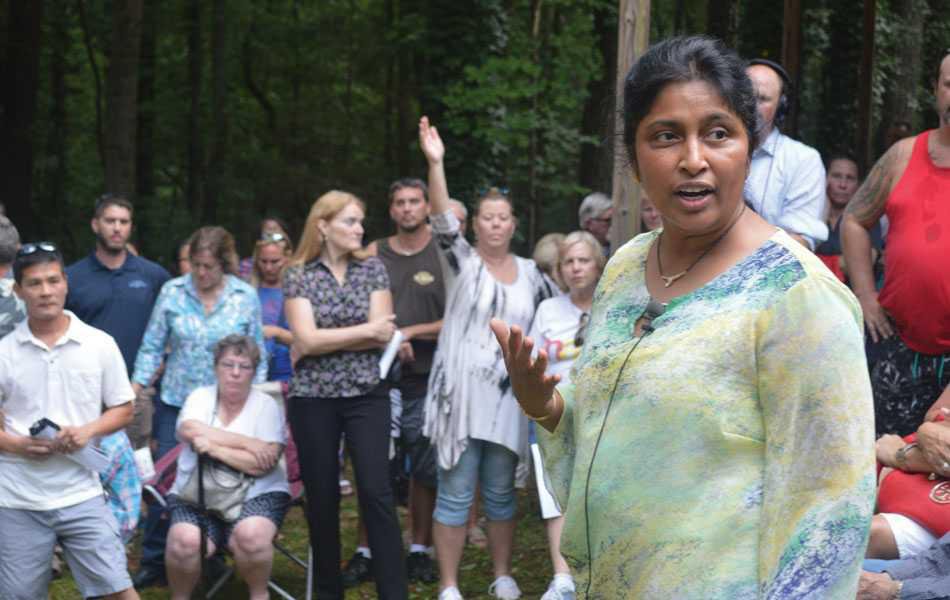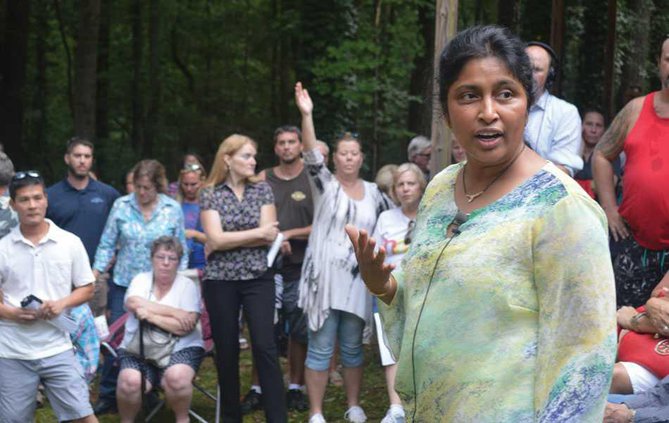CUMMING – The picturesque, quintessential lake house at 5325 Pilgrim Point Road was anything but serene Friday evening.
Tensions ran high as more than 200 residents gathered for a public participation meeting regarding a proposed Hindu temple in the Shady Shores and Bald Ridge on Lanier communities in Cumming.
The plan, submitted in early June by Evansville, Indiana, gastroenterologist Sumaltha Satoor, proposes an 11,200-square-foot temple, along with a 4,128-square-foot priest residence and 113 parking spaces be erected on about 8 acres.
Satoor currently owns the residence in the wooded, lakeside community, which would serve as the priest’s home, and is requesting a conditional use permit – a permit that allows use of a property in a way not permitted by current zoning laws without applying for a rezoning – to build the temple and parking lots on the property currently zoned single family residential restricted district, or R2R.
Details and site plan conditions often change, sometimes drastically, between public participation meetings and when it reaches the planning board, but this application has garnered attention from the get-go.
A number of Forsyth County Sheriff’s Office deputies attended the July 29 meeting as a precautionary, peace-keeping effort, though they were not called to action.
Satoor, who already operates two Hindu temples, said she would delegate the full-time management of the temple, should it be approved, to her son. She would make the trip to Georgia from Evansville on weekends.
“The sense is for people to come and get the peace and quiet,” Satoor said. “[This] doesn’t have to be a huge, big commercial venture.”
Many residents voiced opposing sentiments.
“This is a commercial building going in a single-family area,” said Paula Chambers, a Bald Ridge resident of more than 30 years.
Another resident, Eddie Spivey, agreed.
“This is a commercial business wanting to open in our neighborhood,” he said. “That’s what this is.”
“You’re still very welcome here, you and your family,” another speaker said. “But your temple is not. How am I going to feel every morning or every Saturday or Sunday when I’m hearing traffic go up and down your road? The horns, voices – when am I going to get rest and [get] to relax?”
For the temple to be built, Satoor must overcome the county’s existing zoning laws as well as “restrictive covenants” Bald Ridge subdivision owners established in the early 1980s to keep the area residential.
Section three of the covenant says, “All lots in said area shall be used for residential purposes. Structures created, altered, placed or permitted on any lot, shall consist of only one (1) detached single family dwelling not to exceed two stories in height and one (1) accessory building which may include a detached private garage, provided the use of such accessory building does not include any activity normally conducted as a business.”
Given the temple would not function as a single-family residence, developer and builder Eric Bott was confused as to why the plan had gotten this far.
“I question whether the county can even vote on this, because they can’t supersede us, or supersede Bald Ridge on Lanier’s covenant,” he said. “This is like putting a QT station, a retail station, a retail store or a commercial building in the middle of this neighborhood.”
In her application, Satoor said the temple “will not have an adverse impact on surrounding properties and is consistent with residential uses in the area,” despite there being no other religious – or other commercial – sites in the immediate area.
Satoor also added in her letter of intent, “A denial of the requested conditional use permit would deprive the applicant and persons of the Hindu faith their religious rights and property rights. Denial of the requested use permit would violate the applicants and their guests of their rights to freedom of religion, freedom of speech, due process, and equal protection.”
Residents stressed on Friday their objections have nothing to do with the Hindu religion.
“That’s not what this is about at all. It has nothing to do with it being a church – even if it was my own church I wouldn’t want it to be here,” said Amanda Harden, a Bald Ridge resident.
The loud clapping and “yes’s” reverberating through the trees reinforced Harden’s statement.
“When you come in and change the whole community for what one person wants – these are her wishes, not anyone else’s – that’s where I’m offended,” Spivey said.
Satoor backed the reasoning for her proposal.
“Whatever I make here is going to stay here,” she said. “As long as it’s helping all of you to come and get the serenity that you want, that’s all that matters to me.”
She said she and her attorneys will prepare answers to residents’ questions.
The application must be discussed by the Forsyth County planning board – it has not yet been placed on their agenda – before the process would bring it before the Board of Commissioners for a final vote.
Planning and community development staff members have not yet made a recommendation to the planning board, which then makes recommendations to county commissioners.
“[God] gives the energy, He gives the resources, He gives the money,” she said. “I’m just doing my part – my little part and for my little life – whatever [it is] the life I have here.”

